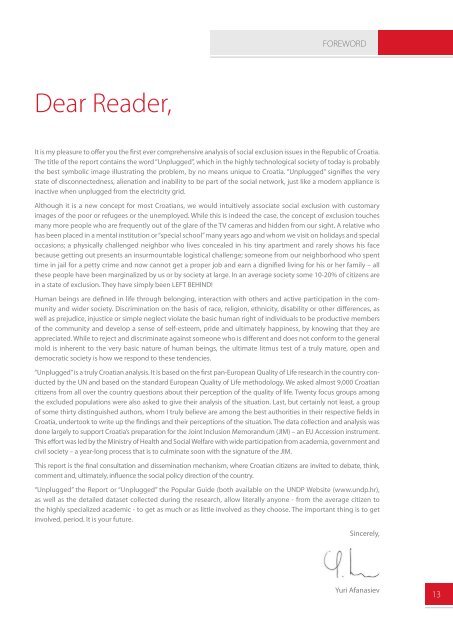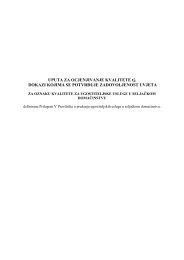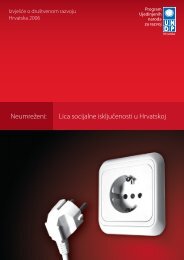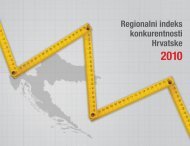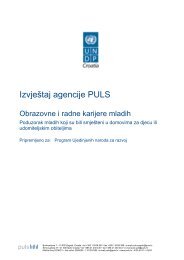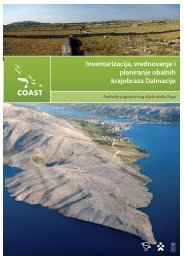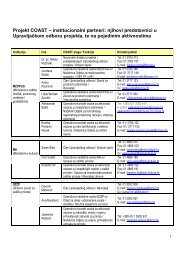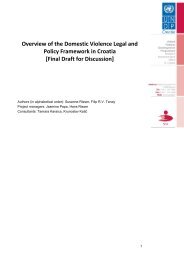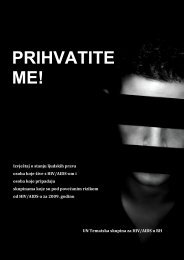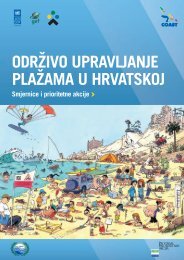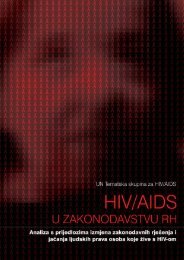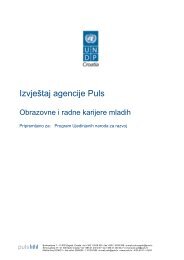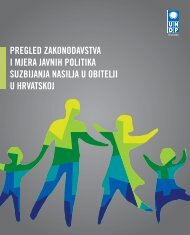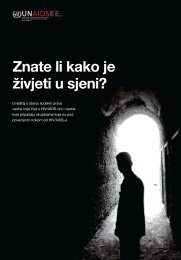WEB engleska verzija end.indd - UNDP Croatia
WEB engleska verzija end.indd - UNDP Croatia
WEB engleska verzija end.indd - UNDP Croatia
- No tags were found...
You also want an ePaper? Increase the reach of your titles
YUMPU automatically turns print PDFs into web optimized ePapers that Google loves.
FOREWORDDear Reader,It is my pleasure to offer you the first ever comprehensive analysis of social exclusion issues in the Republic of <strong>Croatia</strong>.The title of the report contains the word “Unplugged”, which in the highly technological society of today is probablythe best symbolic image illustrating the problem, by no means unique to <strong>Croatia</strong>. “Unplugged” signifies the verystate of disconnectedness, alienation and inability to be part of the social network, just like a modern appliance isinactive when unplugged from the electricity grid.Although it is a new concept for most <strong>Croatia</strong>ns, we would intuitively associate social exclusion with customaryimages of the poor or refugees or the unemployed. While this is indeed the case, the concept of exclusion touchesmany more people who are frequently out of the glare of the TV cameras and hidden from our sight. A relative whohas been placed in a mental institution or “special school” many years ago and whom we visit on holidays and specialoccasions; a physically challenged neighbor who lives concealed in his tiny apartment and rarely shows his facebecause getting out presents an insurmountable logistical challenge; someone from our neighborhood who spenttime in jail for a petty crime and now cannot get a proper job and earn a dignified living for his or her family – allthese people have been marginalized by us or by society at large. In an average society some 10-20% of citizens arein a state of exclusion. They have simply been LEFT BEHIND!Human beings are defined in life through belonging, interaction with others and active participation in the communityand wider society. Discrimination on the basis of race, religion, ethnicity, disability or other differences, aswell as prejudice, injustice or simple neglect violate the basic human right of individuals to be productive membersof the community and develop a sense of self-esteem, pride and ultimately happiness, by knowing that they areappreciated. While to reject and discriminate against someone who is different and does not conform to the generalmold is inherent to the very basic nature of human beings, the ultimate litmus test of a truly mature, open anddemocratic society is how we respond to these t<strong>end</strong>encies.“Unplugged” is a truly <strong>Croatia</strong>n analysis. It is based on the first pan-European Quality of Life research in the country conductedby the UN and based on the standard European Quality of Life methodology. We asked almost 9,000 <strong>Croatia</strong>ncitizens from all over the country questions about their perception of the quality of life. Twenty focus groups amongthe excluded populations were also asked to give their analysis of the situation. Last, but certainly not least, a groupof some thirty distinguished authors, whom I truly believe are among the best authorities in their respective fields in<strong>Croatia</strong>, undertook to write up the findings and their perceptions of the situation. The data collection and analysis wasdone largely to support <strong>Croatia</strong>’s preparation for the Joint Inclusion Memorandum (JIM) – an EU Accession instrument.This effort was led by the Ministry of Health and Social Welfare with wide participation from academia, government andcivil society – a year-long process that is to culminate soon with the signature of the JIM.This report is the final consultation and dissemination mechanism, where <strong>Croatia</strong>n citizens are invited to debate, think,comment and, ultimately, influence the social policy direction of the country.“Unplugged” the Report or “Unplugged” the Popular Guide (both available on the <strong>UNDP</strong> Website (www.undp.hr),as well as the detailed dataset collected during the research, allow literally anyone - from the average citizen tothe highly specialized academic - to get as much or as little involved as they choose. The important thing is to getinvolved, period. It is your future.Sincerely,Yuri Afanasiev13


